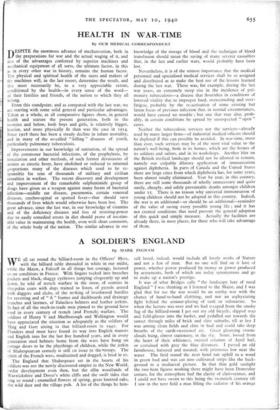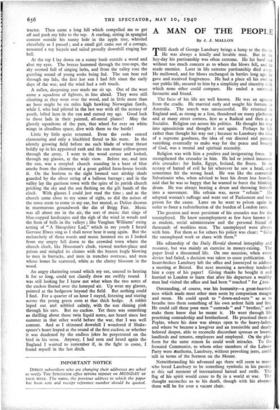A SOLDIER'S ENGLAND By MA RK INGRAM W E all sat round
the billiard-room in the Officers' Mess, with the billiard table shrouded in white in our midst, while the Major, a Falstaff in all things but courage, lectured us on conditions in France. With fingers tucked into breeches pockets and black, shaggy eyebrows jumping eloquently up and down, he told of trench warfare in the snow, of sentries in sheepskin coats with dogs trained to listen, of patrols armed with daggers and clubs, of the 'irking of brushwood hurdles for revetting and of " A " frames and duckboards and drainage trenches and latrines, of Balaclava helmets and leather jerkins. In fact of all the stock-in-trade men pinned to the ground have used in every century of trench (and French) warfare. The soldiers of Henry V and Marlborough and Wellington would have appreciated the situation as adequately as the soldiers of Haig and Gort sitting in that billiard-room in 1940. For Flanders mud must have found its way into English manors and English inns for the last five hundred years, and in every generation steel helmets home from the wars have hung on cottage doors to be the playthings of children, while the jerkin of Shakespearean comedy is still 211 issue to the .troops. The spirit of the French wars, mudstained and dogged, is bred in us.
The England that Shakespeare set in the hearts of his soldiers was not the newly discovered empire in the New World, under development even then, but the elfin woodlands of Warwickshire and Dover's white cliffs and the swift tides that ring us round ; enamelled flowers of spring, great knotted oaks, the wild deer and the village pub. A list of the things he him- self loved, indeed, would include all lovely works of Nature and not a few of man. But no one will find on it love of power, whether power produced by money or power produced by armaments, both of which are today synonymous and go to make up a nation's prestige.
It was of what Bridges calls "the landscape lure of rural England" I was thinking as I listened to the Major, and I was glad that for me the war would be an earthy war with the chance of hand-to-hand clubbing, and not an asphyxiating fight behind the armour-plating of tank or submarine. So when the lecture was over and we had escaped from the smoky fug of the billiard-room I got out my old bicycle, slipped map and field-glasses into the basket, and pedalled out towards the sunset through miles of brick and slate suburbs, till at last I was among clean fields and elms in bud and could take deep breaths of the earth-sweetened air. Great gleaming storm- clouds hung, almost stationary, in the sky. Some, loosed from the heart of their whiteness, twisted columns of April hail, or curtained with grey the blue distances. I passed an old farmhouse, battered and mimed, with primroses low near the water. The field round the next bend ran uphill to a wood in green bud and was cut into cultivated strips like the back- ground to a mediaeval picture. In that thin gold sunlight the two bent figures working there might have been Domesday cottars, for the atmosphere had the clarity of clairvoyance, and I could not have sworn to this being the twentieth century till I saw in the next field a man filling the radiator of his orange tractor. Then came a long hill which compelled me to get off and push my bike to the top. A starling, sitting in spangled content outside his sunny hole in the apple tree, whistled cheerfully as I passed ; and a small girl came out of a cottage, mounted a toy bicycle and sailed proudly downhill ringing her bell.
At the top I lay down on a sunny bank outside a wood and shut my eyes. The breeze hummed through the tree-tops, the sky seemed full of singing larks, and from the valley rose the guzzling sound of young rooks being fed. The sun beat red through my lids, the first hot sun I had felt since the early days of the war, and the wind had a soft touch.
A sullen, deepening roar made me sit up. Out of the west came a squadron of fighters, in line ahead. They were still climbing as they went over the wood, and in little more than an hour might be six miles high hawking Norwegian fjords, while I, who had piloted in the last war with all the ecstasy of youth, lolled here in the sun and cursed my age. Good luck to those lads in their painted, all-metal planes! May the ghostly squadrons of the past, that wheel for ever on white wings in cloudless space, dive with them to the battle!
Little by little quiet returned. Even the rooks ceased clamouring and only a blackbird fluted to his mate. In the silently growing field before me each blade of wheat thrust boldly up in his appointed rank and the sun shone yellow-green through the array. I went to the wood corner and looked, through my glasses, at the wide view. Before me, and into the sun, was a steepled church standing in a haze of blue smoke from the chimneys of a great gabled farm-house beside it. On the horizon to the right loomed vast airship sheds guarded by the silver string of a balloon barrage ; and in the valley lay the garrison town with the spire of its parish church pricking the sky and the sun flashing on the gilt hands of the clock. With glasses I could just read the time ; and as the church came close to my sense of sight, so did the noises of the town seem to come to my ear, but muted, as Delius drowns in murmurous groundwork the din of Brigg Fair. Music was all about me in the air, the sort of music that sings of blue-cupped landscapes and the sigh of the wind in woods and the hum of bells in the valleys ; like Vaughan Williams' string setting of "A Shropshire Lad," which in my youth I heard Gervase Elwes sing as I shall never hear it sung again. But the melancholy of those words and music haunted me as I looked from my empty hill down to the crowded town where the church clock, like Housman's clock, viewed market-place and prison and mingled its chimes with the brazen bugle blowing to men in barracks, and men in trenches overseas, and men whose bones lie scattered, white as the cherry blossom in the wood.
An angry chattering sound which my ear, unused to hearing It for so long, could not classify drew me swiftly round. I was still looking for I knew not what when the two notes of the cuckoo floated over the honeyed air. Up went my glasses, pointed at the hedgerow beyond the field. But nothing could I find. For a quarter of an hour I stayed, listening and staring across the young green corn at that thick hedge. A rabbit loped out and nibbled calmly, with the sun shining pink through his ears. But no cuckoo. Yet there was something so thrilling about those twin liquid notes, not heard since last summer in that other world before the war, that I was well content. And as I skimmed downhill I wondered if Shake- speare's heart leaped at the sound of the first cuckoo, or whether it was deadened by the endless jokes he perpetrated on the bird in his verse. Anyway, I had seen and heard again the England I wanted to remember if, in the fight to come, I found myself in the last ditch.































 Previous page
Previous page